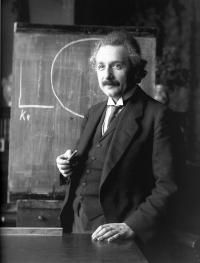
I mentioned recently that I was rereading Ray Ginger’s Six Days or Forever? Tennessee v. John Thomas Scopes (1958) in order to prepare for a talk about the Scopes trial. While doing so, I took notes about more than just the ornate vocabulary, which I discussed in “A Ginger Glossary” (part 1, part 2). Here’s a passage I marked: “Three days later [i.e., on June 22, 1925], as Albert Einstein was declaring in Berlin that ‘any restriction of academic liberty heaps coals of shame upon the community which tolerates such suppression,’ Clarence Darrow arrived in Dayton to get the lay of the land.” That was nice to see, if not especially surprising. After all, I knew that Marie Curie—a Nobelist in physics in 1903 and chemistry in 1911—had deplored the prosecution of Scopes (see “Marie Curie’s Voice for Evolution”), so it wouldn’t be odd for Einstein—a Nobelist in physics in 1921, for his work on the photoelectric effect—to raise his voice for evolution as well.
Characteristically, Ginger didn’t provide a source—in general, he writes, “an elaborate system of footnotes would be misplaced” in a work such as Six Days or Forever? L. Sprague de Camp’s The Great Monkey Trial (which John Harshman mentioned in commenting on “A Ginger Glossary”) is superior in its sourcing, and cites the Pittsburgh Sun for June 22, 1925, for the Einstein quote in particular. Without visiting a research library, I couldn’t find that issue of the Sun, but no harm done: the newspaper was presumably running the United Press story by Frederic Kuh, which I found published in the Syracuse Journal. In the Sun, it apparently ran under the headline “Ape case loosens up tongue of Einstein”; in the Journal, where I read it, it ran under the rather more staid headline “Restriction of academic liberty stirs Einstein,” although the deck to the story described him as “Relativity man,” which is amusing.
Anyhow, according to the story, after “[m]aking it clear that he did not desire his remarks to be interpreted as interference in an American ‘family squabble,’” Einstein declared, just as Ginger says, “Any restriction of academic liberty heaps coals of shame upon the community which tolerates such suppression.” (The phrase “coals of shame,” if you were wondering, is Biblical in origin. Proverbs 25:21–22 recommends, “If thine enemy be hungry, give him bread to eat; and if he be thirsty, give him water to drink: For thou shalt heap coals of fire upon his head, and the LORD shall reward thee.” Exactly what is accomplished by heaping “coals of fire” on the enemy’s head is obscure, but shame appears to be involved, and “coals of shame” is sometimes seen in translations of the verse.) Perhaps to justify his right to condemn Dayton, Einstein added, “The exact sciences may call the whole world their fatherland.”
Einstein wasn’t the only German celebrity quoted in the story. “Professor Zeeburg of the University of Berlin, one of Europe’s leading theologians”—probably Reinhold Seeberg (1859–1935)—remarked, “Darwinism in its original form is a thoroughly stimulating scientific theory,” although he described attempts to apply Darwinism in fields outside biology as “mistaken and old fashioned.” He added, “Scientific theories can be contraverted only through hard facts and cold reason. ... They cannot be disproved by removing their exponent from office,” presumably a reference to Scopes (who, of course, was not in fact fired). And “Count Johann von Bernstorff, once German ambassador to Washington,” remarked, “I am absolutely opposed to any restriction of academic freedom and to all persecution of established facts. The theory of evolution is well supported by all our knowledge and to ignore it would be to show the intelligence of the ostrich.”
Over the course of his life, Einstein wrote a lot and spoke a lot and moreover was widely consulted for comment on the issues of his day, so I hesitate to offer any definitive pronouncement, but it looks as though he never wrote or spoke extensively about evolution or evolution education. There are a few suggestive snippets here and there, however. For example, in 1939, speaking at Princeton Theological Seminary, Einstein famously decried conflicts arising “when a religious community insists on the absolute truthfulness of all statements recorded in the Bible.” The result of such an insistence, he explained, is “an intervention on the part of religion into the sphere of science; this is where the struggle of the Church against the doctrines of Galileo and Darwin belongs.” It’s hard not to believe that the Scopes trial was in his thoughts then. But by all means let me know if you’re aware of any relevant comments from Einstein.
Here’s a closing coincidence. In 1932, reacting to news that Einstein would move to Princeton, New Jersey, to take a position at the new Institute for Advanced Study, the Woman Patriot Corporation, a right-wing organization opposing feminism and socialism, lobbied the Department of State to bar him from the country. In a single-spaced sixteen-page letter, the organization complained that Einstein was a militant pacifist intent on subverting the Constitution. Then, when Einstein visited the United States consulate in Berlin to obtain his visa, he was insultingly interrogated about his politics. Appalled by the treatment of such an eminent scientist, a group of prominent women in New York (including the wife of the president of General Electric) subsequently called for the resignation of the consul general, who, they said, “has humiliated America and made it a laughing stock second only”—to what?—“to the Scopes trial in Tennessee.”

